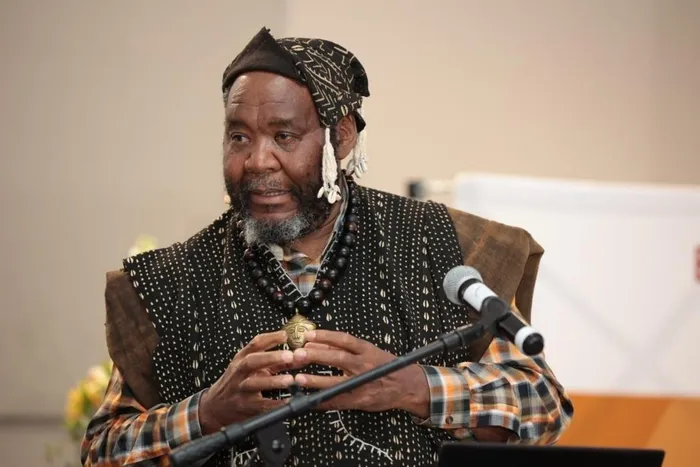Understanding the limitations of fines in the AI trade landscape

Professor Eldrid Jordaan.
Image: Supplied
Two South Africans have acquitted themselves very well in the trade wars of whose sovereignty. This is when it comes to information and knowledge creation. One grew up in Lesotho as a South African refugee and the other in the Cape Flats. Zakes Mda and Eldrid Jordaan have lit the torch of struggle and shed light in the dark and extractive allays of Silicon Valley.
After Donald Trump won the elections as a second term president of the United States, it became clear that South Africa was one on the list of the slash and burn countries. This included the little country, which no one knows about except only the MAGA maniac himself. That South Africa was in the pickle was not only important to the US of “Sleepy Joe” but was equally crucial for the MAGA maniac. That South Africa took Israel to the International Court of Justice made the agenda of the US converge. It mattered not whether it was the Republicans or the Democrats. South Africa in January had to strategise on how they will temper the horses that had bolted out of the White House.
All matters trade were on the agenda. There was and remain the issue of information technology in all its manifestations on the agenda. To this end Professor of Practice at University of Johannesburg, Eldrid Jordaan, based on our paths that crossed on this essential question of whose data and data sovereignty deliberated the matter. In the end it was my considered view that when the President of South Africa assembles his team to meet his counterpart whenever he does, in his information technology munition, he would be advised to take along Jordaan. Why would Jordaan be crucial in that discussion?
Jordaan acquitted himself by taking Meta to court on encroaching the rights of GovChat. The central argument Jordaan made and won is this, “But what they did not understand was that GovChat was a co-created platform. It was co-created with the South African government, with departments like Cogta, the Department of Health, the Department of Social Development and Sassa."
So, it was not just technology that was brought to the South African government; it was actually co-created.
What Facebook then wanted to do was to off board us, and for [itself] to have a direct relationship with the South African government going forward.
So, it is a business model that they wanted to own directly, and they saw us as a threat because we were succeeding in being able to help vulnerable South Africans connect with these [services].
It is this business model that the North continues not to appreciate and they are again faced by a massive fine. This time around from a lad that cut his teeth as a refugee in the streets of Mafeteng in this a country, which according to President Trump no one knows of – Lesotho.
Zakes Mda, a lad from Lesotho, took Anthropics to court and won. His statement reads thus, “You may remember an article in a South African newspaper [I do not remember which one, but they did interview me then] a few months back reporting that my books and those of Nadine Gordimer were used to train ChatGPT without our permission. Some of you who are bo-tsebanyane (know-it-all) sneered when I posted that we were going to sue for compensation. Well, we did sue and there was a case - what they call class-action in the US - called Bartz v. Anthropic which we [fellow writers whose books were used without our permission] won. I received an email from my agents in London which partly reads: "There was a major copyright lawsuit in the US brought by authors against AI company Anthropic for using books without permission to train large language models. A settlement agreement was preliminarily approved in September 2025. The settlement would see authors whose US publications have been used by the company to train AI-models receive a share of $1.5bn."
Mda said, "Whereas the newspaper article had only mentioned Ways of Dying, it turns out that six of my novels were used to train AI and I was none the wiser: The Heart of Redness, The Madonna of Excelsior, The Whale Caller, She Plays with the Darkness, Sometimes there is a Void. Do not be deceived by the billions. They are not all coming to me. They are shared by many writers in the US. But at least, however little, I will be compensated for each of the books that were used. Damn! I did not know of my contribution in the development of AI. But the only reason I am telling you this story is to ask the question: what about our South African writers? You cannot tell me that these AI developers only used books published in the USA. Does South African law allow South African-based writers to fight for their intellectual property rights in South African courts? Or does the so-called "fair use" doctrine leave them out in the cold from enjoying the fruits of their labour?”
Neither did Jordaan or Mda accompany the President to the White House as South Africans of substance when it comes to matters sovereignty. Yet on this crucial point of knowledge base and whose data it is, they shed light on the path of future travel.
The Cape Flats lad Jordaan has authored a book that he has launched here in South Africa and was invited to present by the House of Lords in the United Kingdom. He is now taking the battle into the Goliath’s Hell House – the Silicon Valley where his title The Silicon Empire vs Social Impact – the David against Goliath.
There the David tells a story through his book that fines are not the solution because the Silicon Valley mints dollars in zillions. So, whilst my homeboy Zakes has won and will receive compensation and so will Jordaan against Meta, Jordaan in his book has placed his finger on the pulse – fines are not a solution in this hypersonically extractive trade of artificial intelligence.
Importantly says Jordaan in his book – for this to be beneficial to society the core question that himself – Jordaan and Mda have posed is whose sovereign is data and information resident? This is not a monetisation question but one of impact and to adjudicate impact, legislation is not only a sufficient condition but a necessary one. It is not in the May session that battles of sovereignty are won, but it is in the dusty streets of the Cape Flats and the eroded flatlands of Mafeteng where victims of apartheid continue the fight on a global scale and point the way. It is in these spaces where they perfected their art of war – Jordaan and Mda show the way.

Dr Pali Lehohla is a Professor of Practice at the University of Johannesburg, among other hats.
Image: Supplied
Dr Pali Lehohla is a Professor of Practice at the University of Johannesburg, a Research Associate at Oxford University, and a distinguished Alumni of the University of Ghana. He is the former Statistician-General of South Africa.
*** The views expressed here do not necessarily represent those of Independent Media or IOL.
BUSINESS REPORT